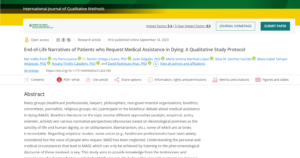Un grupo de investigadoras e investigadores asociados a FiloLab y al proyecto INEDyTO II, del cual forman parte Mar Vallès-Poch, Iris Parra Jounou, Ramón Ortega-Lozano, Janet Delgado, María Victoria Martínez-López, Silvia M. Sánchez Garrido, Maria Isabel Tamayo-Velázquez, Rosana Triviño Caballero y David Rodríguez-Arias, acaban de publicar el artículo «End-of-Life Narratives of Patients who Request Medical Assistance in Dying: A Qualitative Study Protocol» (https://doi.org/10.1177/16094069231202196) en la revista International Journal of Qualitative Methods de la Universidad de Alberta (International Institute Of Qualitative Methodology). Esta investigación ha sido co-financiada por el proyecto INEDyTO II, una beca Grífols 2022 y la Agencia Estatal de Investigación. A continuación compartimos el abstract del artículo y un enlace para acceder al mismo.
Abstract
Many groups (healthcare professionals, lawyers, philosophers, non-governmental organisations, bioethics committees, journalists, religious groups, etc.) participate in the bioethical debate about medical assistance in dying (MAiD). Bioethics literature on the topic involve different approaches (analytic, empirical, policy oriented, activist) and various normative perspectives (discourses based on deontological premises as the sanctity of life and human dignity, or on utilitarianism, libertarianism, etc.), some of which are at times irreconcilable. Regarding empirical studies, some voices (e.g., healthcare professionals) have been widely considered but the voice of people who request MAiD has been neglected. Understanding the personal and medical circumstances that lead to MAiD, which can only be achieved by listening to the phenomenological discourse of those involved, is key. This study aims to provide knowledge from the testimonies and experiences of patients who have initiated a MAiD request. We believe this research protocol can increase our understanding of a social and academic controversy that lacks important information to be complete. By doing so, this type of research could inform and improve end-of-life public policies, and particularly the health care of individuals who request a MAiD. We propose a qualitative phenomenological study using semi-structured interviews of people in the process of requesting MAiD, as outlined in the Ley Orgánica 3/2021, de regulación de la eutanasia (LORE), the Spanish Law on the Regulation of Euthanasia. The study is conducted nationally using a convenience sampling. The number of interviews is determined sequentially and cumulatively, depending on the richness of the narratives and the saturation of the information that has been collected. For the purposes of analysis, the interviews are transcribed verbatim and pseudonymised afterwards. Data analysis is conducted at the same time as data collection. The proposed study has received a favourable report from the Coordinating Committee on Biomedical Research Ethics of Andalusia (CCEIBA).
Puede accederse al artículo completo aquí.

